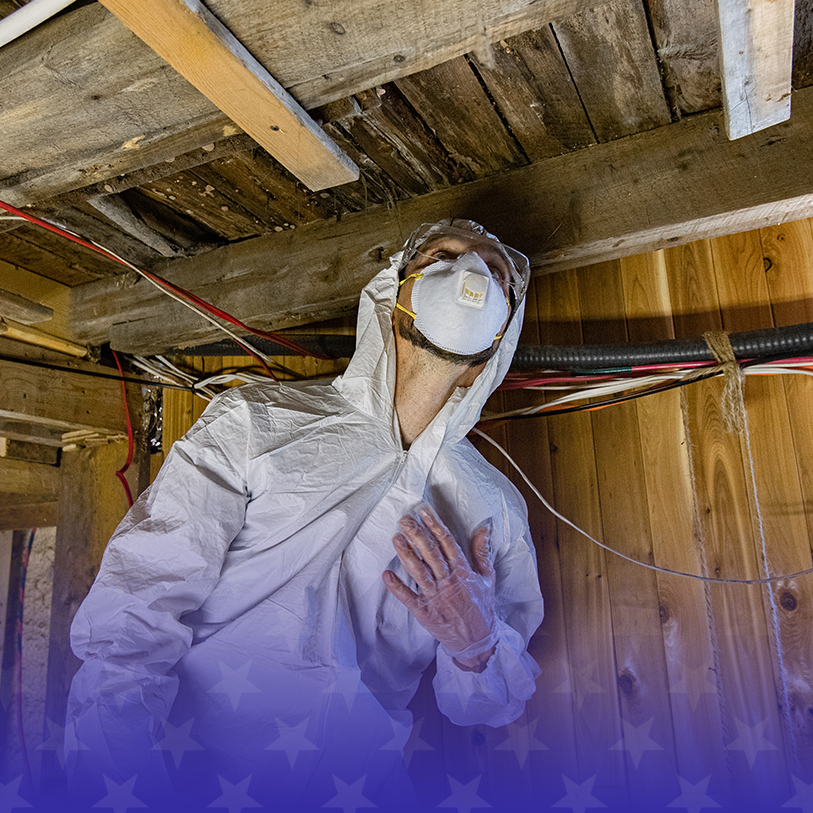
Philadelphia Inspection Services
Industrial Hygiene in Montgomery County, Lehigh County, Northampton County, Bucks County, Mercer County, Burlington County, Chester County, & Norristown
- Asbestos Inspection: Ensure the safety of your property with professional asbestos inspection services. We identify and manage potential risks to keep you compliant and protected.
- Mold Inspection: Detect mold early with our thorough mold inspection services. We pinpoint problem areas to prevent health hazards and structural damage.
- Environmental Inspection: Safeguard your environment with our comprehensive environmental inspections. We assess potential hazards and help maintain healthy and safe living or working spaces.
- Expert Witness Services: Trust our experienced team for expert witness services in litigation. We provide clear, reliable testimony for complex environmental and safety cases.
- Large Loss Consulting: Navigate significant property damage with ease. Our large loss consulting services guide you through recovery and claim processes for efficient solutions.
- Safety Inspection: Prioritize workplace and home safety with our detailed safety inspections. We identify hazards and ensure adherence to safety regulations.
For more information, contact our industrial hygienists online or at (215) 268-7347 today.

What is Industrial Hygiene?
Industrial hygiene is the science and art of anticipating, recognizing, evaluating, and controlling workplace conditions that may cause worker illness or injury. Industrial hygienists use investigative techniques, job hazard analysis, exposure monitoring, and compliance standards to evaluate the extent and circumstances of worker exposures. Using their specialized training and education, they recommend appropriate engineering or work practice controls and other methods to reduce or eliminate potential health hazards.
The U.S. Congress passed three landmark pieces of legislation relating to safeguarding workers' health: The Metal and Nonmetallic Mines Safety Act of 1966, the Federal Coal Mine Safety and Health Act of 1969, and the Occupational Safety and Health Act of 1970.
Today, nearly every employer is required to implement the elements of an occupational health and safety program and to be compliant with the Occupational Safety and Health Administration (OSHA) and its regulations.
Roles of the Industrial Hygienist
Industrial hygienists are committed to keeping workers, their families, and the community healthy and safe. They ensure that federal, state, and local laws and regulations are followed in and around the work environment.
Typical roles of an industrial hygienist include:
- Evaluating the workplace for hazards and potential dangers
- Recommending improvements for the safety of workers and the surrounding community
- Researching possible harmful conditions in the workplace
- Finding solutions to potentially dangerous situations in the workplace and the community
- Training workers about job-related hazards
- Educating the community about the effects of hazards outside the workplace
- Providing advice and participating in the development of regulations to ensure the health and safety of workers and their families
- Ensuring compliance with all health and safety procedures
Eagle Industrial Hygiene can help you with any industrial hygiene needs.
Explore Related Links


Hear From Our Happy Customers
At Eagle Industrial Hygiene Associates, your satisfaction is our priority! See for yourself what our customers have to say about working with us.
-
"We have worked with Eagle Industrial and their partner contractors for over 25 years."The lab work is timely, thorough, and reasonable. They have tackled challenging remediation work with poise and professionalism.- Andy H.
-
"Thanks again!"This was my first time working with this type of business. I had a lot of questions, and I followed up often. Rich was great to work with, never made me feel like I was a bother. We received the testing and reports needed in a great timeframe. Thanks again!- Shannon A.
-
"We have worked with this company many times and are happy to say that they are very good and thoughrough in what they do"We have worked with this company many times and are happy to say that they are very good and thoughrough in what they do Very honest and great company to call if you need testing done and post remediation. Thanks again Mark for all your hard work.- Anthony P.
-
"The testing process is straight forward and affordable."The testing process is straight forward and affordable. The remediation team is transparent and even sought out other potential problem areas which we were able to later remediate.- Chris K.
Categories of Job Hazards
- Air contaminants: Dusts, fumes, mists, fibers, vapors, and gases
- Chemical: Harmful chemical compounds can exert toxic effects via inhalation, absorption (through direct contact with the skin), or ingestion.
- Biological: Bacteria, viruses, fungi, and other living organisms that can cause acute and chronic infections by entering the body either directly or through breaks in the skin
- Physical: Excessive levels of ionizing and nonionizing electromagnetic radiation, noise, vibration, illumination, and temperature
For more information, contact our industrial hygienists online or at (215) 268-7347 today.
